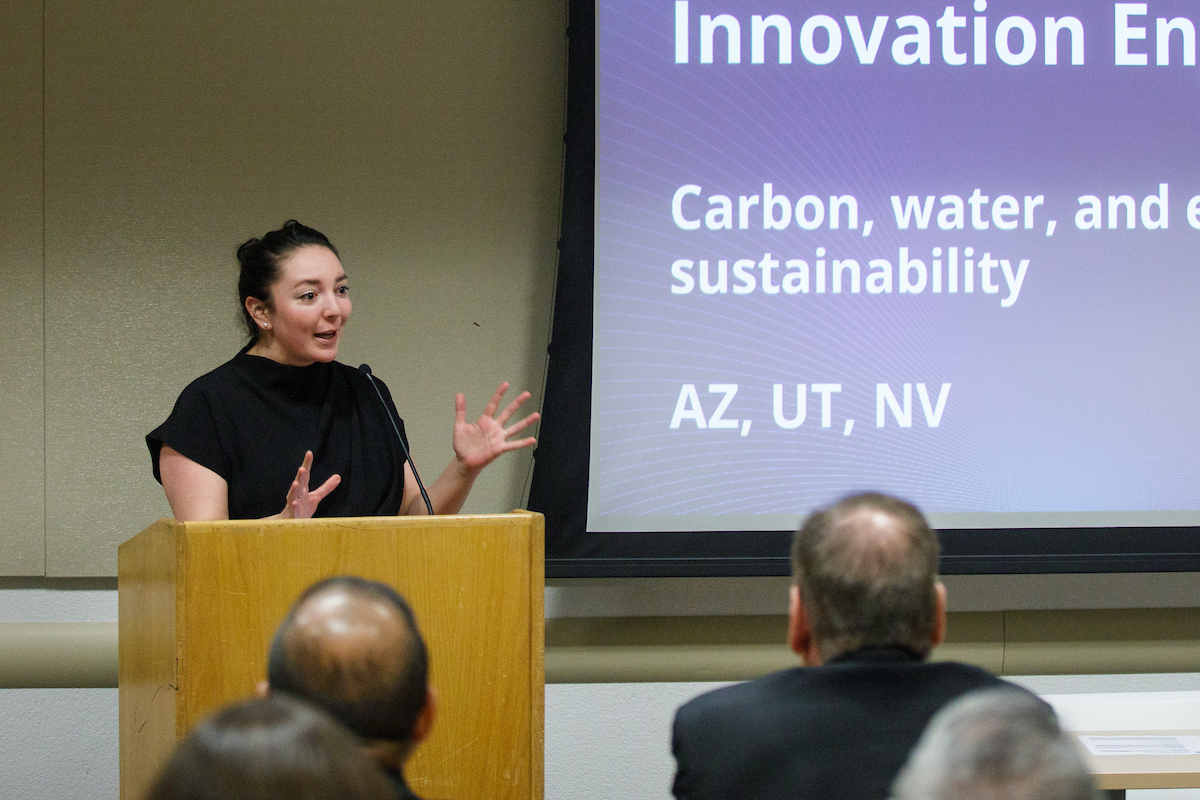NSF Announces New Partners in ASU-led climate, economy initiative

The U.S. National Science Foundation, visiting metropolitan Phoenix along with the White House Office of Science and Technology Policy, today announced three new partners in an initiative to transform the desert Southwest’s climate challenges into economic opportunities.
Ecolab, Hydrosat and the U.S. Green Building Council joined NSF Engines: Southwest Sustainability Innovation Engine. Funded by the U.S. National Science Foundation and led by Arizona State University, SWSIE unites academic, community, nonprofit and industry partners throughout Arizona, Nevada and Utah to establish the Southwest as a leader in carbon capture, water security and renewable energy, and bring high-wage industries to the region.
“The Southwest Sustainability Innovation Engine embodies the President's vision of an American economy where the country's largest problems and climate change are addressed, not by outsourcing our talent and expertise, but by investing right in the heart of communities through place-based investment,” said Justina Gallegos, deputy director for Industrial Innovation at the White House Office of Science and Technology Policy. “This requires a new approach that builds partnerships, that brings together private industry, venture capital, state and local governments, institutions of higher education, including community colleges and technical schools, labor unions, tribal organizations and nonprofit organizations to transform their communities and regions over the next decade.”
Florence Rabanal, NSF Regional Innovation Engines program director, welcomed Ecolab, Hydrosat and the U.S. Green Building Council to a coalition of more than 50 partners in SWSIE.
“We're very, very pleased to have you part of the NSF’s portfolio and excited to have ASU’s leadership,” said Rabanal at an event at Intel’s Chandler campus.
NSF’s Regional Innovation Engines is a first-of-its-kind program designed to coalesce local and regional partners to rapidly develop and deploy solutions-inspired research and advance U.S. competitiveness in their respective focal areas. Overseen by the Directorate for Technology, Innovation and Partnerships — the NSF’s first new directorate in more than 30 years — the program is a key effort to establish regional economic, technological and societal leadership in areas highlighted in the CHIPS and Science Act. In January, the NSF announced SWSIE as one of the 10 inaugural Regional Innovation Engines.
Rabanal and Gallegos visited Chandler as a stop on a tour of the newly established Regional Innovation Engines across the nation to champion investment in and potential of the program.
SWSIE’s initial development and growth is funded by the NSF with $15 million over the next two years. The engine can be renewed for up to 10 years with $160 million in additional funding available for each Regional Engine.
“We are trying to make sure that the Southwest remains a region in which all people thrive and the economy flourishes,” said Peter Schlosser, vice president and vice provost of the Julie Ann Wrigley Global Futures Laboratory, who is the principal investigator of SWSIE.
Schlosser outlined the three major thrusts of SWSIE: research and development, technology translation and economic development. He estimated that these activities could generate $2.7 billion in economic impact for the Southwest, along with 15,000 new jobs and $900 million in tax revenue within 10 years.
Ecolab, Hydrosat and the U.S. Green Building Council all bring unique strengths to help realize SWSIE’s potential.
“Ecolab is excited to collaborate with Arizona State University through the NSF grant on innovations that will deliver economic growth while reducing water and energy intensity in the region,” said Calvin Emanuel, vice president and general manager, Sustainable Growth Solutions, Ecolab. “By embracing creative strategies for water reuse, industries can achieve both their business and sustainability goals.”
“The Southwest U.S. faces some of the greatest climate challenges with respect to water availability, the ability to grow food, and wildfire risk while sustaining a growing population,” said Joshua B. Fisher, science lead for Hydrosat. “Hydrosat is built to solve fast-moving challenges such as these with the best possible data and we are excited to provide an avenue for the foremost young talent to make key contributions towards solving climate issues immediately. Through this partnership Hydrosat stands ready to provide both cutting-edge data and a commercial on-ramp to the Southwest Sustainability Innovation Engine.”
“The U.S. Green Building Council Mountain Region is pleased to announce its support of the Southwest Sustainability Innovation Engine as an official partner,” said Hilari Varnadore, vice president of LEED for Cities, USGBC. “We recognize the urgency and economic value of bringing new technologies to market that enable high performance buildings, create healthy and resilient communities, and that can be adopted widely for broad impact.”
Leaders from industry, academia and local and federal governments gathered at the Intel Chandler campus to discuss the opportunities presented by SWSIE. Following the announcement of the new partners, the event hosted a wide-ranging panel discussion with representatives from Ecolab, ASU, SRP, Intel, Hydrosat and the White House. The panel focused on technological solutions poised to invigorate the Southwest, with water reuse and solar energy storage solutions emerging as top priorities. The panelists also discussed workforce development and talent pipeline and stressed the importance of partnerships in pursuing SWSIE’s goals for the region.
“We are so excited to be working with you and also thank our existing partners like SRP and Intel because we have an unprecedented opportunity here to put these companies which are striving towards ambitious sustainability and job goals for our region together with our researchers and our students and a new generation of workers who will have the green skills to carry out the vision of these companies,” said Diane Pataki, deputy CEO of SWSIE and Foundation Professor with the School of Sustainability in ASU’s College of Global Futures. “So, we hope to be a connector linking the researchers at all of the institutions throughout the region. There's amazing expertise to all of these institutions that we hope you can take advantage of and we want to provide our students with the training that they need so they can come and work on these initiatives.”
About NSF Engines: Southwest Sustainability Innovation Engine
NSF Engines: Southwest Sustainability Innovation Engine (SWSIE), one of the first Regional Innovation Engines in the United States supported by the U.S. National Science Foundation, spans three states — Utah, Nevada and Arizona — forming a regional hub of economic development catalyzed by sustainability innovation. Regional Innovation Engines are advancing critical technologies, address pressing national and societal challenges, cultivating academic-industry-public sector partnerships, promoting economic growth and job creation, and encouraging regional innovation and workforce development. With a focus on enhancing water security, promoting renewable energy, and capturing carbon emissions, SWSIE is establishing a robust innovation ecosystem and includes more than 50 partners to date, led by Arizona State University. This collaboration unites researchers, innovators, investors, decision-makers, and community leaders in fostering a thriving net-zero economy in the Southwest and creates a regional hub for sustainability-focused industries.
About Ecolab
Ecolab is a global sustainability company that offers water, water, hygiene and infection prevention solutions and services. More than a century old, Ecolab advances comprehensive science-based solutions and data-driven insights to promote food safety, maintain clean and safe environments, optimize water and energy use.
About Hydrosat
Hydrosat is a climate-focused technology company that provides satellite imagery and data analytics to measure water stress. Their technology provides insight for millions of acres of farmland around the world.
About the U.S. Green Building Council
The U.S. Green Building Council is a nonprofit organization that promotes environmentally and socially responsible building practices. The USGBC created LEED, or Leadership in Energy and Environmental Design, is the most widely used green building rating system in the world.
